The global charcoal-based detox masks market is projected to grow from USD 1,932.5 million in 2025 to approximately USD 5,340.7 million by 2035, recording an absolute increase of USD 3,405.9 million over the forecast period. This translates into a total growth of 177.7%, with the market forecast to expand at a compound annual growth rate (CAGR) of 10.7% between 2025 and 2035. The overall market size is expected to grow by nearly 2.8X during the same period, supported by the rising consumer awareness about skincare routines and increasing demand for natural detoxification solutions.
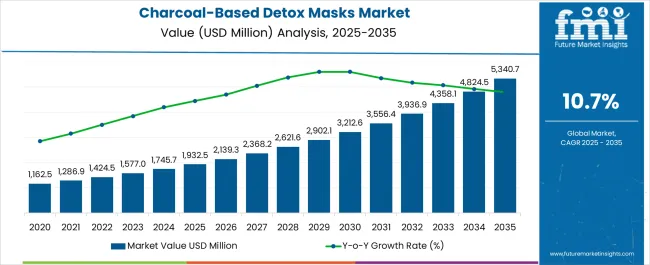
Between 2025 and 2030, the Charcoal-Based Detox Masks market is projected to expand from USD 1,932.5 million to USD 3,207.1 million, resulting in a value increase of USD 1,290.6 million, which represents 37.9% of the total forecast growth for the decade. This phase of growth will be shaped by rising penetration of natural skincare products, increasing consumer awareness about pore cleansing benefits, and growing adoption of Korean beauty trends globally. Beauty brands are expanding their charcoal-based product portfolios to address the growing demand for effective detoxification solutions.
From 2030 to 2035, the market is forecast to grow from USD 3,207.1 million to USD 5,340.7 million, adding another USD 2,115.3 million, which constitutes 62.1% of the overall ten-year expansion. This period is expected to be characterized by advancement of charcoal extraction technologies, integration of additional active ingredients, and development of innovative mask formats across different product categories. The growing adoption of multi-step skincare routines and premium natural ingredients will drive demand for more sophisticated charcoal-based formulations.
Between 2020 and 2025, the Charcoal-Based Detox Masks market experienced substantial expansion, driven by increased social media influence, beauty blogger recommendations, and consumer shift toward natural skincare ingredients. The market developed as consumers became increasingly aware of environmental pollution effects on skin and sought effective solutions for deep pore cleansing and detoxification.
| Metric | Value |
|---|---|
| Estimated Size (2025E) | USD 1,932.5 million |
| Projected Value (2035F) | USD 5,340.7 million |
| CAGR (2025-2035) | 10.7% |
Market expansion is being supported by the growing awareness of skincare benefits offered by activated charcoal and increasing consumer preference for natural, chemical-free beauty products that address urban pollution effects on skin. Modern consumers seek products that provide deep cleansing capabilities, remove impurities, and offer visible results in pore refinement and skin clarity.
The growing influence of K-beauty trends and social media beauty influencers is driving widespread adoption of charcoal-based masks among younger demographics. Beauty brands are increasingly incorporating charcoal with complementary ingredients like clay, botanical extracts, and vitamins to enhance product efficacy and appeal to health-conscious consumers seeking comprehensive skincare solutions.
The market is segmented by function, source, product type, channel, and claim. By function, the market is divided into detoxifying & pore cleansing, oil-control, whitening/brightening, and exfoliation. Based on source, the market is categorized into bamboo-derived charcoal, coconut-derived charcoal, mineral charcoal, and blended actives. In terms of product type, the market is segmented into cream masks, sheet masks, clay masks with charcoal, and peel-off masks. By channel, the market is classified into e-commerce, mass retail, pharmacies, and specialty beauty stores. Based on claim, the market is divided into natural/organic, vegan, clean-label, and dermatologist-tested. Regionally, the market is divided into North America, Europe, East Asia, South Asia & Pacific, Latin America, and Middle East & Africa.
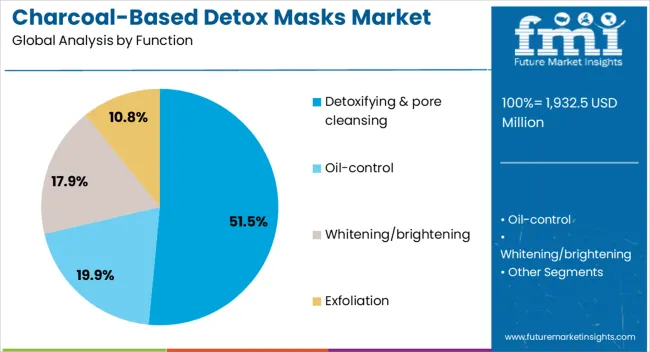
Detoxifying & pore cleansing is projected to account for 51.5% of the Charcoal-Based Detox Masks market in 2025, establishing its position as the leading function category in the global marketplace. This dominant market share is fundamentally supported by the core properties of activated charcoal, which naturally attracts and absorbs impurities, excess oil, and toxins from skin pores, making it the primary consumer expectation from charcoal-based skincare products.
The preference for detoxifying functionality stems from increasing urbanization and pollution exposure, which creates greater need for deep cleansing solutions that can effectively remove environmental contaminants and unclog pores. This segment benefits from proven scientific backing of charcoal's absorption properties and growing consumer understanding of the importance of regular detoxification in skincare routines.
The market leadership of detoxifying & pore cleansing is further reinforced by rising consumer awareness of blackhead and whitehead prevention, increasing focus on preventive skincare, and growing demand for products that provide immediate visible results. The segment benefits from strong social media presence and influencer endorsements that demonstrate the effectiveness of charcoal masks in extracting impurities and refining skin texture.
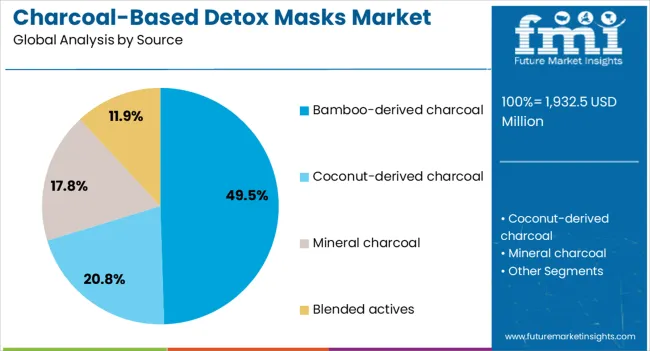
Bamboo-derived charcoal is expected to represent 49.5% of charcoal-based detox masks demand in 2025, establishing its dominance in the source segment. This leading position reflects the superior properties of bamboo charcoal, including its ultra-fine porous structure, enhanced absorption capacity, and sustainable sourcing characteristics that appeal to environmentally conscious consumers.
The bamboo-derived segment benefits from the material's natural antibacterial properties, gentle nature on sensitive skin, and ability to provide deep cleansing without over-drying. Modern consumers prefer bamboo charcoal for its eco-friendly credentials, as bamboo is a rapidly renewable resource that supports sustainable beauty practices and aligns with growing environmental consciousness in personal care choices.
The segment's growth is further supported by premium positioning of bamboo-derived products, increasing availability of high-quality bamboo charcoal sources, and consumer preference for natural ingredients with proven traditional usage in Asian skincare practices. Bamboo charcoal's superior performance characteristics and sustainable profile create strong differentiation in the competitive landscape.
Clay masks with charcoal are projected to contribute 48.3% of the charcoal-based detox masks market in 2025, representing the preferred product format for deep cleansing applications. This product type combines the absorption properties of activated charcoal with the mineral-rich benefits of various clays, creating synergistic effects that enhance overall detoxification and pore refinement capabilities.
The competitive advantage of clay-charcoal combination lies in its ability to provide comprehensive skin treatment through multiple mechanisms: charcoal absorbs impurities while clay provides mineral nourishment and gentle exfoliation. This dual-action approach appeals to consumers seeking maximum efficacy from their skincare treatments and creates superior user experience through visible results.
Clay masks with charcoal offer versatility in formulation, allowing brands to incorporate different clay types (bentonite, kaolin, French green clay) with charcoal to target specific skin concerns and create differentiated product offerings. The format supports various application methods and provides satisfying user experience through the traditional mask ritual that consumers associate with professional spa treatments.
The market is advancing rapidly due to increasing awareness of natural skincare benefits and growing consumer concern about environmental pollution effects on skin health. However, the market faces challenges including potential skin sensitivity reactions, need for proper product education, and varying quality standards across different charcoal sources. Ingredient sourcing sustainability and product safety validation continue to influence market development patterns.
The growing incorporation of complementary active ingredients including hyaluronic acid, niacinamide, and botanical extracts with charcoal is enhancing product efficacy and expanding target consumer base beyond traditional detox-focused applications. These combinations provide comprehensive skincare benefits while maintaining the core charcoal detoxification properties.
Modern charcoal mask formulations are incorporating high-end ingredients such as gold particles, rare clays, and exotic botanical extracts to create luxury product lines that command premium pricing. Integration of advanced delivery systems and spa-quality formulations elevates the category from basic cleansing to comprehensive skincare treatment experiences.
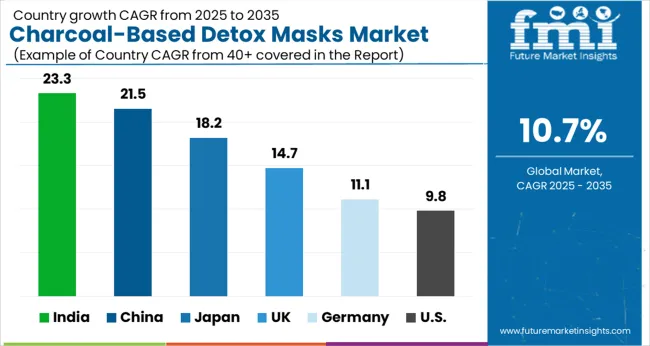
| Country | CAGR (2025 to 2035) |
|---|---|
| India | 23.3% |
| China | 21.5% |
| Japan | 18.2% |
| UK | 14.7% |
| Germany | 11.1% |
| USA | 9.8% |
The charcoal-based detox masks market is growing rapidly across key regions, with India leading at a 23.3% CAGR through 2035, driven by rising beauty consciousness, increasing disposable income, and growing adoption of K-beauty trends. China follows at 21.5%, supported by strong e-commerce growth and consumer preference for natural skincare solutions. Japan grows at 18.2%, emphasizing premium quality and innovative formulations. The UK records 14.7% growth with focus on natural and organic beauty trends. Germany shows 11.1% growth driven by quality-conscious consumers. The USA demonstrates steady 9.8% growth with established market presence and diverse distribution channels.
Revenue from charcoal-based detox masks in India is projected to exhibit the highest growth rate with a CAGR of 23.3% through 2035, driven by rapid urbanization, increasing pollution awareness, and growing adoption of global beauty trends among young consumers. The country's expanding middle class, combined with rising disposable income and digital beauty education, creates an ideal environment for natural skincare products that address urban pollution effects on skin health.
Revenue from charcoal-based detox masks in China is expanding at a CAGR of 21.5%, supported by sophisticated digital commerce infrastructure, strong consumer adoption of beauty trends, and significant influence of K-beauty culture. The country's advanced e-commerce ecosystem and integration of social commerce create favorable conditions for beauty product discovery and purchasing, particularly for natural skincare solutions.
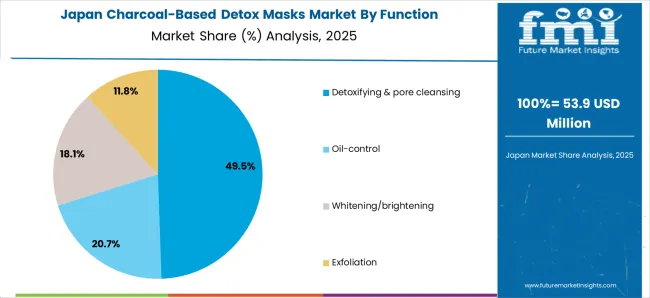
Revenue from charcoal-based detox masks in Japan is growing at a CAGR of 18.2%, driven by the country's leadership in beauty innovation, sophisticated consumer preferences, and strong cultural emphasis on skincare quality and ritual. Japanese consumers demonstrate high acceptance of natural ingredients with traditional usage history and willingness to invest in premium products that deliver measurable results.
Demand for charcoal-based detox masks in the UK is projected to grow at a CAGR of 14.7%, supported by strong consumer interest in natural and organic beauty products, established clean beauty market, and growing awareness of environmental impact on skin health. British consumers demonstrate high willingness to invest in sustainable skincare products that promise effective results through natural ingredients and ethical sourcing practices.
Demand for charcoal-based detox masks in Germany is expanding at a CAGR of 11.1%, driven by consumer preference for scientifically-validated skincare solutions, established quality standards, and growing acceptance of natural ingredients with proven benefits. German consumers value precision, efficacy, and transparency in beauty products, creating strong demand for charcoal masks that demonstrate clear scientific backing and measurable skin improvement results.
Demand for charcoal-based detox masks in the USA is growing at a CAGR of 9.8%, characterized by diverse consumer segments, established beauty retail infrastructure, and steady adoption of natural skincare trends. The American market demonstrates strong interest in Korean beauty influences while maintaining focus on accessibility, convenience, and proven results through established distribution channels and brand recognition.
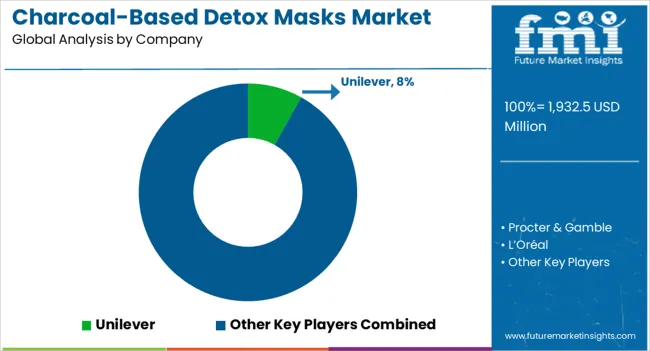
The charcoal-based detox masks market is characterized by competition among established personal care giants, specialized natural beauty brands, and emerging K-beauty influenced companies. Companies are investing in sustainable sourcing, innovative formulations, premium packaging, and digital marketing strategies to deliver effective, appealing, and accessible charcoal-based skincare solutions. Brand partnerships, ingredient innovation, and consumer education are central to strengthening product portfolios and market presence.
Unilever leads the market with an 8% global value share in 2025, focusing on mass market accessibility through established retail distribution and affordable pricing strategies. Procter & Gamble emphasizes scientific research and dermatologist-tested formulations. L'Oréal provides premium positioning with luxury packaging and advanced ingredient combinations. Shiseido offers sophisticated Japanese-inspired formulations with premium positioning.
Colgate-Palmolive focuses on natural ingredient sourcing and family-friendly product development. Beiersdorf emphasizes dermatological expertise and sensitive skin formulations. The Body Shop provides ethical sourcing and environmental sustainability focus. Origins offers natural ingredient expertise with spa-quality experiences. Clinique delivers dermatologist-developed solutions with clinical backing. Himalaya provides traditional ingredient wisdom with affordable accessibility.
| Items | Values |
|---|---|
| Quantitative Units (2025) | USD 1,932.5 million |
| Function | Detoxifying & pore cleansing, Oil-control, Whitening/brightening, Exfoliation |
| Source | Bamboo-derived charcoal, Coconut-derived charcoal, Mineral charcoal, Blended actives |
| Product Type | Cream masks, Sheet masks, Clay masks with charcoal, Peel-off masks |
| Channel | E-commerce, Mass retail, Pharmacies, Specialty beauty stores |
| Claim | Natural/organic, Vegan, Clean-label, Dermatologist-tested |
| Regions Covered | North America, Europe, East Asia, South Asia & Pacific, Latin America, Middle East & Africa |
| Countries Covered | United States, Canada, United Kingdom, Germany, France, China, Japan, South Korea, India, Brazil, Australia and 40+ countries |
| Key Companies Profiled | Unilever, Procter & Gamble, L'Oréal, Shiseido, Colgate-Palmolive, Beiersdorf, The Body Shop, Origins, Clinique, and Himalaya |
The global charcoal-based detox masks market is estimated to be valued at USD 1,932.5 million in 2025.
The market size for the charcoal-based detox masks market is projected to reach USD 5,340.7 million by 2035.
The charcoal-based detox masks market is expected to grow at a 10.7% CAGR between 2025 and 2035.
The key product types in charcoal-based detox masks market are detoxifying & pore cleansing, oil-control, whitening/brightening and exfoliation.
In terms of source, bamboo-derived charcoal segment to command 49.5% share in the charcoal-based detox masks market in 2025.






Full Research Suite comprises of:
Market outlook & trends analysis
Interviews & case studies
Strategic recommendations
Vendor profiles & capabilities analysis
5-year forecasts
8 regions and 60+ country-level data splits
Market segment data splits
12 months of continuous data updates
DELIVERED AS:
PDF EXCEL ONLINE
Detox Products Market Analysis - Size, Share, and Forecast Outlook 2025 to 2035
Analysis and Growth Projections for Detox Drink market
Detox face Oil Market
Feed Mycotoxin Detoxifiers Market Analysis - Size, Share, and Forecast Outlook 2025 to 2035
TerraCotta Clay for Detoxification Market Size and Share Forecast Outlook 2025 to 2035
ETCO2 masks market
Disposable Masks Market Analysis by Product Type, Application, Closure, Sales Channel and Region 2025 to 2035
Probiotic Face Masks Market Size and Share Forecast Outlook 2025 to 2035
Anesthetic Gas Masks Market
Chelating Facial Masks Market Analysis - Size and Share Forecast Outlook 2025 to 2035
Heat-Activated Beauty Masks Market Analysis - Size, Share, and Forecast Outlook 2025 to 2035
Nonrebreathing Oxygen Masks Market
3D-Printed Personalized Masks Market Size and Share Forecast Outlook 2025 to 2035
Artificial Ventilation and Anaesthesia Masks Market Size and Share Forecast Outlook 2025 to 2035

Thank you!
You will receive an email from our Business Development Manager. Please be sure to check your SPAM/JUNK folder too.
Chat With
MaRIA